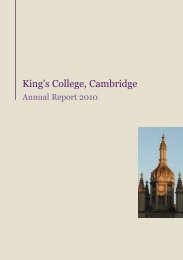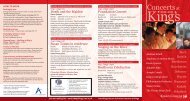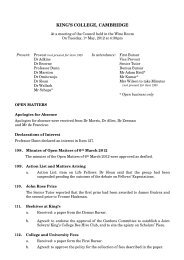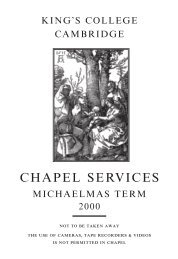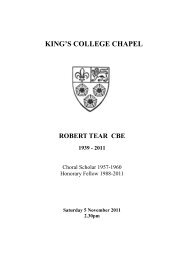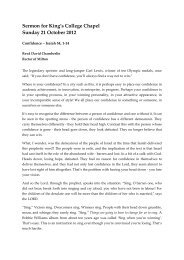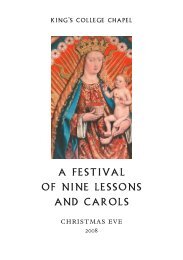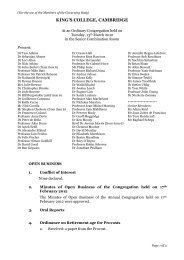Part 2 (Obituaries) - King's College - University of Cambridge
Part 2 (Obituaries) - King's College - University of Cambridge
Part 2 (Obituaries) - King's College - University of Cambridge
You also want an ePaper? Increase the reach of your titles
YUMPU automatically turns print PDFs into web optimized ePapers that Google loves.
232<br />
OBITUARIES<br />
In the late 1940s and early 1950s, Warren attended Yale <strong>University</strong> to study<br />
English Literature, in which he excelled, graduating magna cum laude (highest<br />
honours) and winning the prestigious Fulbright scholarship to study at<br />
<strong>Cambridge</strong>, where he completed a Master’s degree in History.Throughout his<br />
years at university,Warren also was very active in sports.Yale rated him one <strong>of</strong><br />
their top squash players, and the game remained a passionate pastime for him<br />
throughout his life.<br />
In 1961, Warren began what would become a distinguished career in the US<br />
Department <strong>of</strong> State, eventually serving as the USA’s last Ambassador to the<br />
former nation <strong>of</strong>Yugoslavia. He also served at the embassies in Moscow, Paris<br />
and Caracas, and as the United States Ambassador to the Conference on<br />
Security and Cooperation in Europe, which was held in Vienna.<br />
Throughout his service, Warren believed in an active US strength responsibly<br />
accomplishing good causes, a position highly influenced by the philosophies <strong>of</strong><br />
Dean Acheson and Cold War policies. His penchant for action and fervent<br />
commitment to promoting human rights, however, made Warren increasingly<br />
ill at ease with the Clinton administration’s distrust <strong>of</strong> American power, as well<br />
as the waxing Republican readiness to use international power unilaterally.<br />
On the one hand, Warren was horrified by American inaction during the<br />
early years <strong>of</strong> Balkan disintegration, and recalled his Belgrade years viscerally<br />
in his book Origins <strong>of</strong> a Catastrophe. In that book he bemoans that “Western<br />
diplomacy was reduced to a kind <strong>of</strong> cynical theatre, a pretence <strong>of</strong> useful<br />
activity, a way <strong>of</strong> disguising a lack <strong>of</strong> will. Diplomacy without force became<br />
an unloaded weapon, impotent and ridiculous.”Yet, on the other hand, the<br />
diplomatic action for which Warren strived was meant always to improve<br />
the enjoyment <strong>of</strong> rights throughout the world. Arthur Hartman, the former<br />
US Ambassador to France and the Soviet Union with whom Warren served,<br />
recalled him as “the fellow who always brought us back to the human<br />
element <strong>of</strong> our jobs”.<br />
Warren’s diplomatic marriage <strong>of</strong> action and compassion led to mounting<br />
frustration while serving as the US envoy to Yugoslavia, a post that he held



